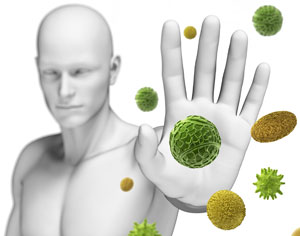Testosterone Deficiency and the Immune System
Research on testosterone deficiency and the immune system brings to light many important issues.
The first question focuses on the effects of testosterone deficiency on immune system functions.
The second aspect of this subject is how higher levels of testosterone interfere with a healthy immune response in the body.
For many reasons, men’s and women’s bodies differ; however, the research on testosterone and the immune system brings forth many other issues.
For example:
- Women have a higher percentage of developing autoimmune diseases than men
- Men with higher levels of testosterone have poor immune responses to the influenza vaccine
- Women have higher levels of signaling proteins in their blood that are passed back and forth by immune cells to start the process of inflammation that activates the immune system responses
When a person has low testosterone, immune system responses such as these occur:
- T-cell (white blood cells) production increases, and while these T-lymphocytes are crucial to fight infections, an overproduction of them can increase the risk of developing autoimmune diseases, which is why women with their lower testosterone levels are more at risk than men.
- Because the body naturally converts excess testosterone into estrogen, if there is not enough testosterone available for conversion, a person may also suffer from estrogen deficiency, which decreases B lymphocyte, NK cell, and T helper cell activity while also increasing inflammatory responses.
The hormone specialists at National HRT evaluate each person’s situation, along with blood test and physical examination results before determining any treatment protocols.
Low testosterone levels increase T-cell production, but overproduction can increase the risk of developing autoimmune disease.
Impact of High Testosterone on the Immune System
Just as low testosterone has its pros and cons, there are also ways that high levels of testosterone help immune system functions, as well as hindering them:
- If testosterone levels are too high, corticosterone levels increase, suppressing immune activity.
- The next concern is that high testosterone increases the amount available for estradiol conversion. If too much testosterone is converted into estrogen that could then suppress thyroid functions, along with reducing the activity of NK cells and interleukin 2, a type of white blood cell produced by T-cells to stimulate the immune system.
- Increased estrogen resulting from testosterone conversion also decreases the thymus gland size which depresses immune actions.
High testosterone levels can suppress immune activity.
How to Use Testosterone Levels to Affect the Immune System
This research leads us to the question of whether or not treating testosterone deficiency can affect the immune system.
In some cases, such as with cancer, will reducing the level of testosterone help to improve treatment?
The answer may be yes for some people. If testosterone levels were too high and suppressed immune cells from forming, decreasing the level of testosterone could increase T-cell production.
For other people, the answer may be no. Testosterone is sometimes used to treat cases of hormone positive cancer. Testosterone can also help to restore PSA levels and prostate size in some men.
This is not a clear answer across the board, and each case is looked at for its own needs and merit.
Low testosterone, on the other hand, is often associated with low zinc levels, which can also impact immunity. Supplemental zinc can stimulate both testosterone and immune responses in the body.
Before embarking on any form of hormone replacement, whether prescription of over-the-counter supplementation, please speak with the HRT specialists at National HRT to find out precisely what your body requires. Consultations are confidential and provided at no charge.
- Associations between male testosterone and immune function in a pathogenically stressed forager-horticultural population Benjamin C Trumble, Aaron D Blackwell Jonathan Stieglitz, Melissa Emery Thompson, Ivan Maldonado Suarez Hillard Kaplan, and Michael Gurven Am J Phys Anthropol. 2016 Nov; 161(3): 494–505.
- Sex Hormones Determine Immune Response Veena Taneja Published online 2018 Aug 27.
- Anabolic androgenic steroids effects on the immune system: a review Sonya Marshall-Gradisnik Rachel Green Ekua Brenu Robert Weather Published Online: 2009-01-31




